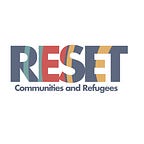‘You can’t impose empowerment’ — Reflections from Eveline, a Community Sponsor in Bristol
Community Sponsorship naturally attracts people who want to help others. You get involved in Community Sponsorship because you want to help refugees in a practical way.
But sometimes helping people can disempower them. So how do you empower newly arrived refugees rather than simply help them?
As someone who has welcomed a refugee family through Community Sponsorship, I can tell you this is much easier said than done (especially when Ccoronavirus comes along!). Like all Community Sponsorship Groups, we planned our support for a refugee family around enabling independence, but we found that not all our plans went smoothly once the family arrived.
To a certain extent, this is inevitable. You’ll never be able to fully prepare to support a family before they arrive because they’re individuals, but there are things you can do to make sure your support is easily adaptable to their needs.
In this blog, I’ll share a couple of things that I wish I’d known, and what Covid-19 has taught us.
Plan in small steps
Looking back on it, I think we underestimated how much support the family would need to take on some of the simpler tasks involved in living in our local area, such as using public transport. Our support plan was based on the family being able to do things like catch the bus themselves once we’d shown them how to do it once or twice.
For a lot of newly arrived refugee families, this approach might work just fine. In fact, you may find that the family don’t even want you to show them how to do it the first time because they find it very straightforward. But the family that we support includes a couple of individuals with very complex needs and it quickly became clear that tasks like catching the bus were more daunting for them than we had anticipated. They were also very anxious about getting lost in a strange city, where initially they could not even read the signs.
This meant that we supported them more intensely for longer than we’d planned. This was absolutely the right thing to do at first, but the problem was that we got used to providing this high level of support. It became habitual. And then before you know it, the family has been here for months and you realise that they’re still really nervous about catching the bus on their own, which isn’t sustainable.
What I wish we’d done is plan for a more gradual reduction in support levels. If we go back to the example of catching the bus, this could mean breaking this task down into lots of little steps like putting your arm out for the bus, telling the driver where you want to go, counting out the right change, identifying the right stop and so forth. On the first trip, you would do everything, and then with each of the following trips, the person you’re supporting would take on an additional element of the task. These seem like little steps but are in fact huge. It takes a lot of practice for someone to have the confidence to talk to the driver or to deal with the money. Finding the right stop is a big problem too and a photo of the place they are going can really help.
The reason I suggest doing it this way is that it’s hard to start putting steps like this in place once you’ve got into the habit of providing a really high level of support, whereas it would be very easy to just skip steps if you find that the family needs less intense support.
Coronavirus
We never imagined that we would be supporting a refugee family through a pandemic and we’ve had to change our support really quickly in the last few months.
The changes that we’ve made have had a range of outcomes — some positive and some less so. On the one hand, the family have had to do some things themselves that they were nervous about doing before. They’re now confident doing a food shop online and so we won’t need to help them with that anymore. In a way, social distancing forced us into a bit of a tough-love approach!
On the other hand, it’s been harder to support them to navigate the benefits system in an empowering way. Normally I would sit with the family member responsible for managing their benefits and we would work things out together, whether it was coping with online forms or making phone calls where she had to be present. Since I can’t sit with her now, we’ve had to find ways around this, where I have taken on more responsibility than I had been doing.
Now that I have more experience supporting the family, I’m already thinking ahead about how to avoid letting this become a habit and how I can support the family to take this over again as soon as possible.
But these are not normal times so I won’t be too tough on myself. Easing out of the lockdown is going to take time and we can’t expect to just bounce back to normality. Once again, I’ll be prepared to adapt to new circumstances and take things step-by-step, moving at a pace that works for the family. If there’s one thing that I want other Community Sponsorship Group members to take away, it’s that you need to be flexible to empower someone rather than simply help them. You have to start from where they are and work with them at their pace. You can’t impose empowerment.
